Artificial intelligence, or AI for short, is a fascinating field that has captured the imagination of scientists and enthusiasts alike. In this article, we will explore the four core beliefs that form the foundation of AI. By understanding these beliefs, you will gain insight into the principles and concepts that guide the development and advancement of this revolutionary technology. So, let’s dive right in and unlock the secrets behind the 4 core beliefs of AI.
Understanding AI
Artificial Intelligence (AI) is a fascinating field that aims to create machines capable of simulating human intelligence. The goal of AI research is not just to imitate human intelligence, but also to develop machines that can perform tasks in a way that is similar to how humans think and learn. In order to understand the core beliefs of AI, it is important to delve into the definition of AI and the goals that drive its research.
Definition of AI
AI can be defined as the ability of machines to exhibit intelligence or simulate human cognitive processes. It involves the development of computer systems that can perform tasks that would normally require human intelligence, such as visual perception, speech recognition, decision-making, and even creative thinking. Artificial intelligence is a multidisciplinary field that encompasses areas such as computer science, mathematics, statistics, psychology, and neuroscience.

Goals of AI research
The primary goals of AI research revolve around creating machines that possess human-like intelligence and can solve complex problems. These machines should be capable of learning from their experiences, adapting to new situations, and improving their performance over time. The overarching aim is to develop AI systems that can understand, reason, and interact with humans in a natural and intuitive manner. By achieving these goals, AI has the potential to revolutionize numerous industries, from healthcare to finance, and enhance our everyday lives.
Core Belief 1: Intelligence can be Replicated
One of the fundamental beliefs of AI is that human intelligence can be replicated using computational systems. AI researchers strongly believe that human cognition and reasoning can be understood and simulated to create intelligent machines. By studying the way humans think, learn, and make decisions, AI endeavors to replicate these processes within a computational framework. This belief forms the basis of AI research and drives the development of algorithms and models aimed at emulating human intelligence.
AI’s belief in replicating human intelligence
AI researchers believe that human intelligence is not a mysterious or magical phenomenon, but rather a product of the brain’s information processing capabilities. By breaking down human intelligence into its constituent components, such as perception, reasoning, memory, and learning, AI strives to recreate these functions in machines. This belief in the replicability of human intelligence is what propels AI research forward, as researchers continuously seek to unlock the secrets of the human mind and transfer that knowledge to computational systems.
The Turing Test
An important milestone in AI research is the Turing Test, proposed by the British mathematician and computer scientist Alan Turing in 1950. The essence of the Turing Test is to determine whether a machine can exhibit intelligent behavior indistinguishable from that of a human. In this test, a human judge interacts with two entities, one being a machine and the other a human, without knowing which is which. If the judge cannot consistently differentiate between the machine and the human, the machine is said to have passed the Turing Test and exhibits intelligent behavior comparable to a human. The pursuit of passing the Turing Test represents AI’s belief in the achievability of replicating human intelligence.

Core Belief 2: Data is the Key
Data plays a pivotal role in the field of AI. AI researchers firmly believe that the quality and quantity of data are crucial for building intelligent systems. The availability of vast amounts of data has led to the development of machine learning techniques, which form the backbone of many AI applications today.
The importance of data in AI
Data serves as the foundation upon which AI systems are built. AI algorithms require large amounts of data to learn patterns, make predictions, and derive meaningful insights. The more diverse and representative the data, the more effective and accurate the AI system becomes. By analyzing and understanding data, AI systems can recognize patterns, make informed decisions, and even identify correlations that humans may overlook. Data fuels the learning process in AI and enables machines to acquire knowledge and improve their performance over time.
Machine learning and data-driven decision making
AI systems rely heavily on machine learning, a subfield of AI that enables machines to learn and improve from experience. Machine learning entails training algorithms on large datasets to recognize patterns and make predictions or decisions. This data-driven approach allows AI systems to automatically adapt and optimize their performance based on new information. By learning from data, AI systems can make informed decisions and generate insights that enable humans to solve complex problems more efficiently and effectively.
Core Belief 3: Algorithms Drive AI
Algorithms are the driving force behind AI systems. AI researchers firmly believe that the development of robust and effective algorithms is crucial for creating intelligent machines.
The role of algorithms in AI
Algorithms are sets of instructions that guide machines to perform specific tasks or solve problems. In the realm of AI, algorithms provide the framework for machines to process data, make decisions, and learn from experience. They lie at the heart of AI models, enabling machines to mimic human cognitive processes and exhibit intelligent behavior. AI algorithms can be designed to perform a wide range of tasks, from image recognition to natural language processing, and are constantly evolving to address new challenges and improve performance.
Different types of algorithms used in AI
AI employs a diverse range of algorithms, each tailored to specific tasks or problems. Some of the most commonly used algorithms in AI include:
-
Supervised Learning: This algorithm learns from labeled data and is used for tasks such as classification and regression. It involves training a model on input-output pairs and using this knowledge to make predictions on new, unseen data.
-
Unsupervised Learning: Unlike supervised learning, unsupervised learning algorithms work with unlabeled data. They aim to discover patterns or structures within the data without any predefined labels or outputs. Clustering and anomaly detection are examples of unsupervised learning tasks.
-
Reinforcement Learning: Reinforcement learning algorithms learn by interacting with an environment and receiving feedback in the form of rewards or penalties. This type of learning is often used in scenarios where an agent needs to make a sequence of decisions to maximize a long-term objective.
-
Deep Learning: Deep learning algorithms, also known as neural networks, are inspired by the structure and function of the human brain. They consist of interconnected layers of artificial neurons and are capable of learning hierarchical representations of data. Deep learning has found applications in various domains such as image recognition, natural language processing, and speech synthesis.
Core Belief 4: AI Will Improve Over Time
AI researchers firmly believe that the potential for AI to improve and surpass human capabilities is immense. This belief drives continuous research and development in the field, as researchers strive to push the boundaries of what AI can achieve.
The belief in continuous AI improvement
AI is not a stagnant field; it is dynamic and constantly evolving. AI researchers believe that advancements in technology, algorithms, and data availability will contribute to the continuous improvement of AI systems. As more data becomes accessible, AI models can become more accurate and make better predictions. Similarly, ongoing research into novel algorithms and computational techniques allows AI systems to tackle increasingly complex problems. The belief in continuous improvement fosters innovation and drives AI researchers to overcome challenges and make significant strides in the field.
AI’s potential to surpass human capabilities
A cornerstone belief of AI is the potential for machines to surpass human capabilities in certain tasks. While AI systems are designed to assist humans and augment their abilities, there is a growing awareness and excitement surrounding the idea that AI has the potential to outperform humans in certain domains. Already, AI has demonstrated remarkable achievements in areas such as image recognition, natural language understanding, and game-playing. This potential for AI to surpass human capabilities motivates researchers to continue exploring and pushing the boundaries of what machines can accomplish.
In conclusion, understanding the core beliefs of AI is essential to comprehend the direction and potential of this field. AI researchers firmly believe in the replicability of human intelligence, the significance of data, the role of algorithms, and the continuous improvement of AI systems. By embracing these beliefs, AI has the potential to revolutionize multiple industries and enhance various aspects of our lives. As we continue to unlock the mysteries of artificial intelligence, we inch closer to a future where intelligent machines work hand in hand with humans, augmenting our abilities and opening new frontiers of possibility.
